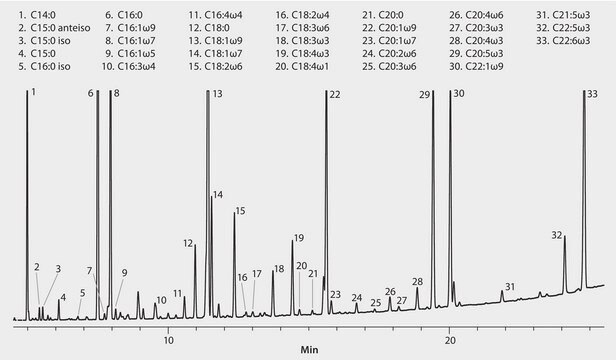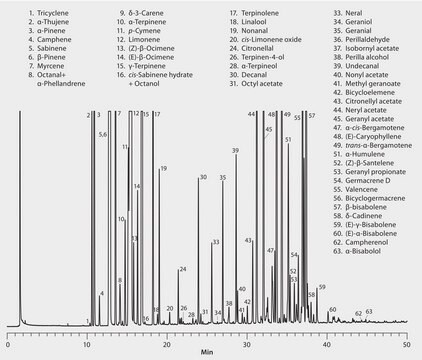24029
SPB®-1 Kapillar-GC-Säule
L × I.D. 30 m × 0.25 mm, df 1.00 μm
Anmeldenzur Ansicht organisationsspezifischer und vertraglich vereinbarter Preise
Alle Fotos(1)
About This Item
UNSPSC-Code:
41115710
eCl@ss:
32119290
Empfohlene Produkte
Materialien
fused silica
Qualitätsniveau
Agentur
meets requirements for USP G1, G2, and G9
Parameter
-60-320 °C temperature (isothermal or programmed)
Beta-Wert
63
df
1.00 μm
Methode(n)
gas chromatography (GC): suitable
L × ID
30 m × 0.25 mm
Aktive Matrixgruppe
Bonded; poly(dimethyl siloxane) phase
Säulenart
capillary non-polar
Suchen Sie nach ähnlichen Produkten? Aufrufen Leitfaden zum Produktvergleich
Allgemeine Beschreibung
Anwendung: Diese Säule wird häufig für traditionelle Anwendungen für allgemeine Zwecke, bei denen eine unpolare Säule erforderlich ist, eingesetzt. Analyten werden primär gemäß ihres Siedepunkts getrennt.
USP-Code: Diese Säule entspricht den Anforderungen von USP G1, G2 und G9.
Phase:
USP-Code: Diese Säule entspricht den Anforderungen von USP G1, G2 und G9.
Phase:
- Gebunden
- Poly(dimethylsiloxan)
- ≤0,32 mm Innendurchmesser, <2 μm: -60 °C bis 320 °C (isotherm oder programmiert)
- ≤0,32 mm Innendurchmesser, ≥2 μm: -60 °C bis 300 °C (isotherm oder programmiert)
- ≥0,53 mm Innendurchmesser, <2 μm: -60 °C bis 300 °C (isotherm) oder 320 °C (programmiert)
- ≥0,53 mm Innendurchmesser, ≥2 μm: -60 °C bis 260 °C (isotherm) oder 280 °C (programmiert)
Anwendung
SPB®-1 Capillary GC Column was used for speciation of the nitrogen compounds (quantitatively), which are polar and somewhat basic in nature, with chemiluminescence detection.
Sonstige Hinweise
We offer a variety of chromatography accessories including analytical syringes
Rechtliche Hinweise
SPB is a registered trademark of Merck KGaA, Darmstadt, Germany
Lagerklassenschlüssel
11 - Combustible Solids
WGK
WGK 1
Flammpunkt (°F)
214.0 °F - closed cup
Flammpunkt (°C)
101.1 °C - closed cup
Hier finden Sie alle aktuellen Versionen:
Besitzen Sie dieses Produkt bereits?
In der Dokumentenbibliothek finden Sie die Dokumentation zu den Produkten, die Sie kürzlich erworben haben.
Pooja Mittal et al.
Journal of ultrasound in medicine : official journal of the American Institute of Ultrasound in Medicine, 26(3), 347-353 (2007-02-28)
Evaluation of fetal cerebral cortex sulcation is important for the pre-natal diagnosis of neuronal migration disorders. Although abnormal sylvian fissure morphologic features are frequently observed in these conditions, the diagnosis of an abnormal sylvian fissure relies on subjective interpretation of
Arunachalam Paraneeiswaran et al.
Journal of hazardous materials, 283, 582-590 (2014-12-03)
Naturally stressed habitats are known to be repositories for novel microorganisms with potential bioremediation applications. In this study, we isolated a [Co(III)-EDTA](-) reducing bacterium Bacillus licheniformis SPB-2 from a solar salt pan that is exposed to constant cycles of hydration
Siyi Wang et al.
Colloids and surfaces. B, Biointerfaces, 107, 251-256 (2013-03-26)
By combining turbidimetric titration, dynamic light scattering (DLS), and zeta potential methods, we demonstrated that the adsorption of bovine serum albumin (BSA) in annealed cationic spherical polyelectrolyte brushes (SPB) can be controlled by modulating the pH, ionic strength, BSA concentration
Hiromi Kitano et al.
Journal of colloid and interface science, 282(2), 340-348 (2004-12-14)
Telomers of N,N-dimethyl-N-(3-sulfopropyl)-3'-methacryloylaminopropanaminium inner salt (SPB), 2-methacryloyloxyethyl phosphorylcholine (MPC), and N,N-dimethyl-N-(1-carboxymethyl)-2'-methacryloyloxylethanaminium inner salt (CMB) were prepared by UV irradiation in the presence of N,N,N',N'-tetraethylthiuram disulfide and a disulfide-group-carrying iniferter (a compound which pursues initiation, chain transfer, and termination), Cys-BDC, which
David Schleheck et al.
Applied and environmental microbiology, 70(7), 4053-4063 (2004-07-09)
Parvibaculum lavamentivorans DS-1(T) utilized the commercial surfactant linear alkylbenzenesulfonate (LAS) (20 congeners with C(10) to C(13) side chains) as a carbon and energy source by shortening the side chain, and sulfophenylcarboxylates (SPCs) and similar compounds (e.g., alpha,beta-unsaturated SPCs [SPC-2Hs]) were
Unser Team von Wissenschaftlern verfügt über Erfahrung in allen Forschungsbereichen einschließlich Life Science, Materialwissenschaften, chemischer Synthese, Chromatographie, Analytik und vielen mehr..
Setzen Sie sich mit dem technischen Dienst in Verbindung.



